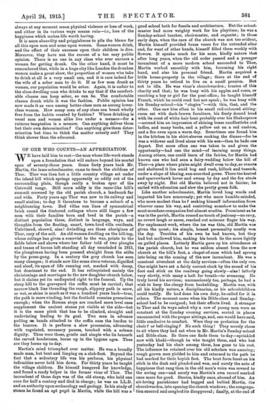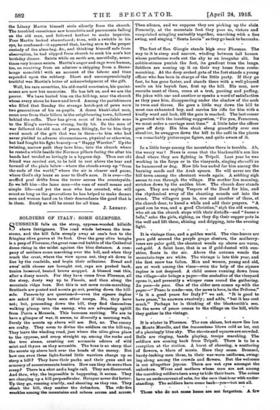OF ONE WHO COUNTS—AN APPRECIATION.
WE have laid him to rest—the man whose life-work stands upon a foundation that will endure beyond his mortal span of seventy-three years. Some forty years back Mr. Martin, the lame schoolmaster, came to teach the children of Thor. Thor was then but a little country village set under the island hill which springs apparently so oddly out of the surrounding plain, though really a broken spur of the Cotswold range. Still more oddly is the razor-like hill's summit crowned by the old parish church, a landmark far and wide. Forty years ago Thor was new to its railway and small station ; to-day it threatens to become a suburb of a neighbouring town. Red villas run lines of symmetrical brick round the timbered cottages where still linger a few men with their families born and bred in the parish—a distinct population these, distinct in language, ways, and thoughts from the floating, smart, town-bred villa residents. Unlettered, shrewd, alas! dwindling are these aborigines of Thor, racy of the soil. An old woman dwelling on the hill-top, whose cottage has given a reservist to the war, points to the fields below and shows where her father told of two ploughs and teams of horses left standing all day unminded in ISA the ploughmen having been pressed straight from the stilts by the press-gang. In a century the grey church has seen many changes ; it stands now like some stern veteran, dignified and aloof, its span of life running out, marked with decay, but dominant to the end. It has relinquished mainly the christenings and marriages to the new daughter-church below, but it claims yet its undisputed right to the funeral. Up the steep hill to the graveyard the coffin must be carried; that narrow black line threading the rough, slippery path in snow, or wet, or shine is much as it was a hundred years back—true, the path is more winding, but the foothold remains precarious enough; when the Roman steps are reached more level ones supplement the ancient stones yet visible at the side—but it is the same pitch that has to be climbed, straight and undeviating leading to its goal. Two men in advance pulling on bands attached to the coffin ease the burden to the bearers. It is perforce a slow procession, advancing with regulated, necessary pauses, touched with a solemn dignity. Thus were those, gentle and simple who lie beneath the carved headstones, borne up in the bygone ages. Thus are they borne up to-day.
Martin's mind triumphed over matter. He was a broadly made man, but bent and limping on a club-foot. Beyond the fact that a sedentary life was his perforce, his physical infirmities never held him down. For thirty years he taught the village children. He himself hungered for knowledge, and found a ready helper in the former vicar of Thor. The incumbent of those days was of the old stamp, who held one cure for half a century and died in charge ; he was an LL.D. and an authority upon archaeology and geology. In his study of stones he found an apt pupil in Martin, while the hill was a
good school both for fossils and architecture. But the school. master had more weighty work for his playtime; he was a Sunday-school teacher, choirmaster, and organist ; in those early days, when the care of the church was not too evident, Martin himself provided brass vases for the untended altar and, for want of other hands, himself filled them weekly with flowers. It speaks much for his sane, kindly nature that after long years, when the old order passed and a younger incumbent of a more modern school succeeded to Thor, Martin worked smoothly with him, becoming his right hand, and also his personal friend. Martin acquired a little house-property in the village ; there at the end of thirty years he retired to live on a small pension. But not to idle. He was vicars churchwarden ; trustee of this charity and that; he was busy with his apples and roses, or coaching a boy or girl for the post-office ; he taught himself French, which he could read but not speak ; he was busy with his Sunday-school—hie " ologies "—with this, that, and the other. One saw him often in his small red-coloured sitting- room set with dark-brown furniture, his finely domed head with its crest of white hair bent probably over his Shakespeare —around him an impression of shining brass candlesticks and ladles. and many books, and a yellow cat on a red cushion, and a fire even upon a warm day. Sometimes one found him in the kitchen in his shirt-sleeves cooking the dinner—for he was a widower and lived alone with his eon—then he bade one depart. But more often one was taken in and given the opportunity—had one the mind—of learning many things. Among others, one could learn of the fairies, for Martin had known one who had seen a fairy-wedding below the hill of Thor—a place where pixies might dwell even to-day, so remote and sheltered it lies amid bog and rush, hillock and tussock, under a elope of blazing, sun-scorched gorse. There the kestrel and sparrowhawk hover and swoop by day and the fox steals away by night. But old Martin believed not in fairies; he united with education and slew the pretty green folk.
Like another schoolmaster, Martin loved long words and imparted his lore sonorously; yet who more humble-minded, who more modest than he P seeking himself information from whoever came his way, and contriving somehow to make the most mundane companion feel almost erudite. Prominent as he was in the parish, Martin roused no touch of jealousy—no envy, no covert laugh or sneer, reached out noisome finger his way. For unpleasant work, where the ice was thin, old Martin was given the quest; his simple, honest personality mostly won the day. Troubles of his own he had known, but they had but mellowed him, making his touch lie the more lightly on galled places. Latterly Martin gave up his attendance at the parish church, but he was seldom absent from the new church at the hill's foot, a chapel-of-ease which had sprung into being on the coming of the new incumbent. He was a constant attendant at the daily services—often the only one, One might have set a fairly correct clock by the sound of his foot and stick on the roadway going slowly—ales ! latterly very slowly, with many a halt for breath—to evensong. He truly loved his services; unconsciously too, perhaps, he had a wish to keep the clergy from backsliding. Martin was, with all his kindly nature, a disciplinarian, as his schoolchildren could testify. He had done his own duty, he called for it in others. The moment came when his Bible-class and Sunday. school had to be resigned; but their effects lived. A. stranger
to Thor and its ways asked why a row of young men were so constant at the Sunday evening services, seated in places
unconnected with the proper sittings, and, one would have said,
little conducive to comfort. Were they on probation for the choir P or bell-ringing P No such thing I They merely chose to sit where they had sat when in Mr. Martin's Sunday-school and Bible-claas. So there one finds them to-day—sprinkled now with khaki—though he who taught them, and who but yesterday had his chair among them, has gone to his rest.
The influence he retained over his old scholars was amazing; rough grown men yielded to him and returned to the path he
had marked for their boyish feet. The bent form leant on his
stick in the dusk and pleaded and won, and surely the note of happiness that rang then in the old man's voice was reward to
the erring one—and surely was Martin's own record marked once more for good. Stories, kindly ones, abound of him. An air-loving parishioner had begged and bullied Martin, the
churchwarden, into opening the church windows ; the congrega- tion sneezed and coughed its disapproval ; finally, at the end of
the Litany Martin himself stole silently from the church. The troubled conscience saw bronchitis and pneumonia falling an the old man, and followed hotfoot to make inquiries. Poor Martin looked shamefaced ; then, with a twinkle in his eye, he confessed—it appeared that, having seen to the proper custody of the alms-bag, ,to., and thinking himself safe from observation, he bad slipped from church to cook his son's hot birthday dinner. Sainte while on earth are, mercifully, some- times very human saints. Martin's anger and rage were human, too, on receiving from an admirer a chipping from a Stone- henge monolith / with an account of the labour and time expended upon the robbery. Short and uncompromisingly truthful was Martin's letter of acknowledgment of the gift.
Well, his rare severities, his old-world courtesies, his quaint- nesses are now but memories. He has left us, and we are the poorer. We have buried him on the hill-top, near the church whose every stone he knew and loved. Among the parishioners who filled that Sunday the strange botch-pot of pews were two generations of his ex-pupils. A dozen khaki-clad men, come over from their billets in the neighbouring town, followed behind the coffin. Thor has given most of its available sons to the King's service—a strong, hardy lot. So the men of war followed the old man of peace, fittingly, for to him they owed much of the grit that was in them—to him who had never yielded to adverse circumstance., physical or otherwise, but had fought his fight bravely—a" Happy Warrior." Up the twisting, narrow path they bore him; into the church where be rested a while beside the Norman pillars facing the altar his hands bad tended so lovingly in a bygone day. Then our old friend was carried out, to be laid to rest above the tear and turmoil of the plain below—where the clouds sweep up "from the ends of the world," where the air is clearer and purer, where God's sky lean. so near to God's acre. It is over—the muffled peal drifts from the tower across the countryside. So we left him—the lame man—the man of small means and simple life—and yet the man who has counted, who will count so long as the generations he has helped to make decent men and women hand on to their descendants the good that is in them. Surely so will he count for all time.
S. Lamm,.















































 Previous page
Previous page